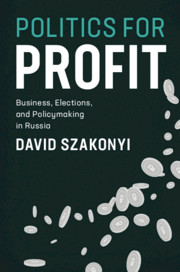Book contents
- Frontmatter
- Dedication
- Contents
- List of Figures
- List of Tables
- Acknowledgments
- Introduction
- 1 A Theory of Businessperson Candidacy
- 2 Identifying Businesspeople Who Run for Office
- 3 Economic Competition, Weak Parties, and Businessperson Candidacy
- 4 Choosing Ballots, Parties, and Delegates
- 5 Firm-Level Returns from Businessperson Candidacy
- 6 Businesspeople as Policymakers
- 7 Conclusion and Policy Recommendations
- Appendix
- Bibliography
- Index
- Series Page
4 - Choosing Ballots, Parties, and Delegates
Published online by Cambridge University Press: 15 June 2020
- Frontmatter
- Dedication
- Contents
- List of Figures
- List of Tables
- Acknowledgments
- Introduction
- 1 A Theory of Businessperson Candidacy
- 2 Identifying Businesspeople Who Run for Office
- 3 Economic Competition, Weak Parties, and Businessperson Candidacy
- 4 Choosing Ballots, Parties, and Delegates
- 5 Firm-Level Returns from Businessperson Candidacy
- 6 Businesspeople as Policymakers
- 7 Conclusion and Policy Recommendations
- Appendix
- Bibliography
- Index
- Series Page
Summary
This chapter looks at three types of decisions businesspeople must make once they decide to run for office. First, I take advantage of Russia’s mixed-member electoral system to develop and test hypotheses about when businesspeople run in single-member districts rather than on party lists. Using the same dataset presented in Chapter Two, I find evidence that the autonomy offered by an SMD seat is more highly valued since it provides for uninhibited and open lobbying of firm interests. Next, I investigate how businesspeople approach the issue of party alignment, showing how firm characteristics such as ownership and asset specificity (which require different types of benefits from the state) increase the appeal of aligning with the ruling party. I also show that rivals join opposing political parties in order to push for their own individual interests. At least with regard to businessperson candidates, politics is just another arena for direct competitors to protect their interests against one another. Finally, I investigate why some firms send employees other than their firm directors into public office. A final set of analysis tests this set of hypotheses linking the decision to delegate candidacy to the degree of politician shirking experienced.
Keywords
- Type
- Chapter
- Information
- Politics for ProfitBusiness, Elections, and Policymaking in Russia, pp. 136 - 179Publisher: Cambridge University PressPrint publication year: 2020

